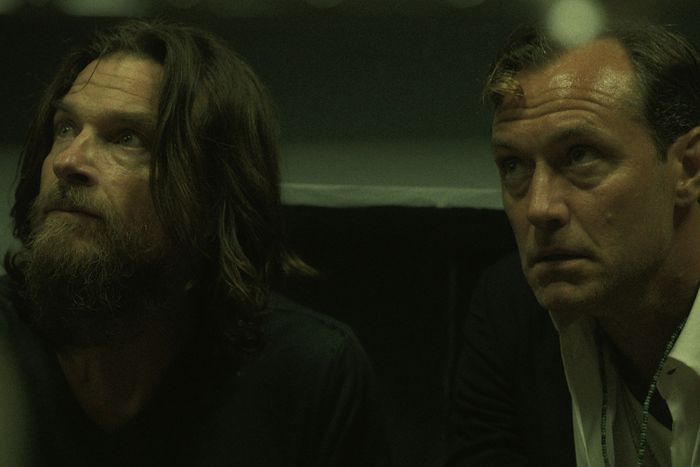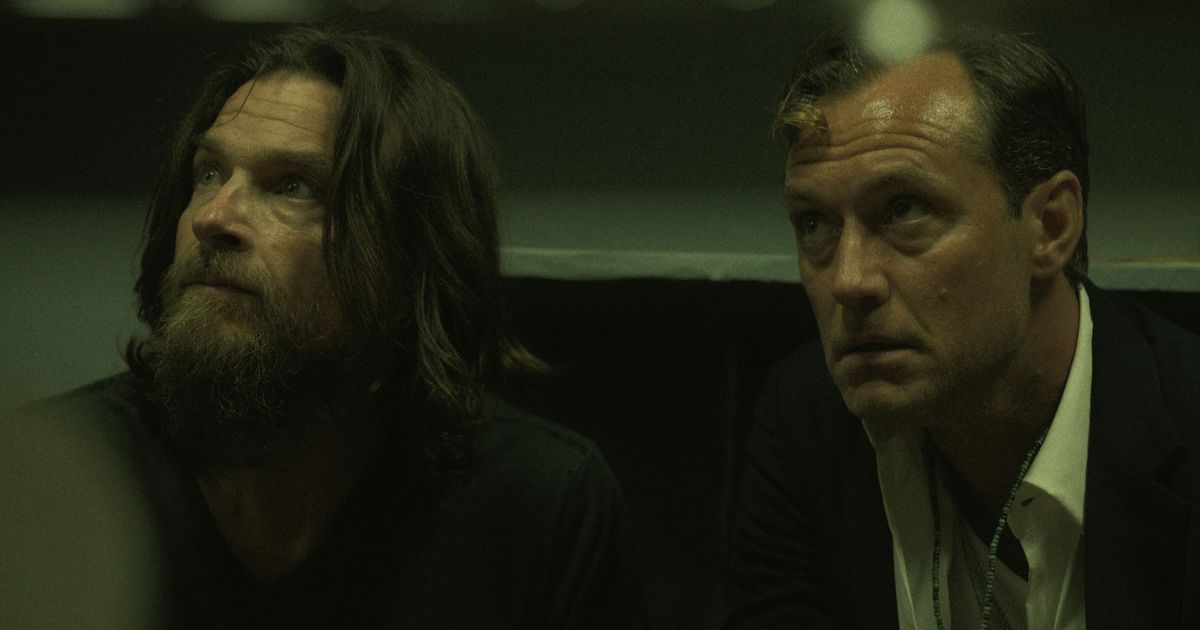
At Black Rabbit’s core is the relationship between gambling and heroin addict Vince (Jason Bateman) and restaurant owner Jake (Jude Law), two brothers who constantly disappoint and protect each other.
Photo: Courtesy of Netflix
A few minutes into the second episode of Netflix’s absorbing, anxiety-inducing, and astonishingly acted Black Rabbit, Jude Law dons a scraggly bleach-blond wig. As Jason Bateman steps behind a set of drums, the series slides from its groggily desaturated color palette into grimy black-and-white. Suddenly, Black Rabbit goes from being a thriller about a pair of codependent fuckup brothers to a flashback music video showing them at the height of their coolness, and it is simultaneously ludicrous — that wig! — and undeniably convincing. Law as a dead ringer for ’90s Damon Albarn, who knew?
As brothers Jake (Law) and Vince Friedkin (Bateman), these two have swagger, they are at ease in front of a camera, and they are going to be famous forever. The crash back down to earth when Black Rabbit returns to their present-day problems of debt, loneliness, and despair is a bummer, but it’s also instructive. In the span of only 30 or so seconds, Law and Bateman convey everything this duo had, and everything they lost.
Black Rabbit’s eight episodes, which premiere on Netflix on September 18, have a lot going on in both form and narrative. Emulating the breakneck pace of NYC restaurant life, the series packs in plot about unresolved daddy issues, rampant sexual abuse in the nightlife industry, and the bloody rituals of underground bookies. It combines Mississippi Grind’s sprinting-toward-danger vibe with Wes Anderson’s fraught familial dynamics and Michael Mann’s eye for urban geography. But at Black Rabbit’s core is the relationship between restaurant owner Jake and gambling and heroin addict Vince, two men who constantly disappoint and protect each other, and the unexpected richness of the Law-Bateman pairing complements and elevates everything around them.
Black Rabbit is co-created and primarily written by Zach Baylin and Kate Susman, who respectively wrote and produced the 2024 Justin Kurzel crime drama The Order, in which Law played an aggrieved FBI agent chasing a neo-Nazi group led by Nicholas Hoult. A number of those same players are here (Law, of course, as well as Kurzel, who directs Black Rabbit’s final two episodes, and actress Odessa Young), and the two projects share a similar curiosity about masculine ambition. How much is one defined by the things they’re avoiding and evading, rather than by their own sense of self? How do our paths become tied to someone we might not like very much, and maybe even hate? Black Rabbit incorporates those questions into its tapestry of brotherhood and then builds out the world surrounding Jake and Vince as various threads dangling off the piece. Baylin and Susman pull off the magic trick of moving various plotlines seemingly incrementally within an episode, subtly building waves of action that then crash throughout the whole series. A little information about bartender Anna’s (Abbey Lee) beef with Jake here, some brief backstory about Vince’s past with a menacing bookie there, and then suddenly we’re listening to people plot insurance-fraud schemes and watching fingers get chopped off. Black Rabbit knows how to escalate, and Law and Bateman anchor that delirious intensity with a pair of performances that, within seconds, go from endearing to infuriating and then back again.
Set in present-day-ish New York City, Black Rabbit begins in the titular establishment, where Jake reigns supreme as the ringleader of a four-story restaurant and private club packed with celebrities like musician turned entrepreneur Wes (Sopé Dìrísù) and his interior-designer partner Estelle (Cleopatra Coleman, scene-stealing again after Clipped). The place is busy every night thanks to the elevated bar food of Chef Roxie (Amaka Okafor), and flush from that success, Jake has his eyes on taking over a venerated lounge called the Pool Room. The expansion would cost hundreds of thousands of dollars, but Jake is mostly confident it’ll pay off in the long run, thanks to a positive New York Times review. In every meeting with Roxie and with his financiers, Law plays his somewhat sleazy salesman persuasiveness from a light emotional remove, like Jake is always convincing himself, along with everyone else, that he’s doing the right thing. And once we meet Vince, we understand Jake’s hesitancy: How can you ever commit to anything, especially involving money, when you’ve got a heroin-loving criminal for a brother?
Bateman’s Vince is scraggly and slump-shouldered where Law’s Jake is coiffed and straight-backed, but he’s also got the confidence of someone who has more than once talked his way out of situations and into second chances he shouldn’t have. (Bateman gets some great insults directed at other lowlifes; he gives such unexpected rhythm to lines like “Why don’t you grow a fucking ball bag and rob a bank?” that it feels like you’re watching someone shit-talk in the style of jazz.) When Vince reappears in Jake’s life, spouting half-truths about what he was getting up to out West that directly contradict events we saw earlier, Vince can tell it’s bullshit, too. But these two, even as they annoy and irritate each other, even as they stew in resentment and bitterness, are like those balls on opposing sides of a Newton’s cradle, each of them whacking at the matter between them and unable to escape their bond. Each needs the other to maintain balance, and Law and Bateman have the convincing physical shorthand of siblings, the little eyebrow raises and exasperated smirks that convey a lifetime spent loving and infuriating each other.
That familiarity is the backbone of Black Rabbit, and it gives urgency and emotional weight to everything that comes after the brothers reunite: the reveal of their myriad secrets; the introduction of the horrifyingly intimidating bookie Mancuso (magnetic Oscar winner Troy Kotsur) and his history with the brothers; an assault story line that raises questions of whether either of the Friedkins could accurately be called a good guy. The series is sly in layering all this together, essentially practicing sleight of hand as it makes us care primarily about the brothers while also developing all the other relationships — and betrayals — housed within the walls of the Black Rabbit playground. A murderers’ row of supporting actors, including Dagmara Domińczyk, Morgan Spector, and Forrest Weber (excellently updating the Ziggy Sobotka archetype), give Bateman and Law worthy sparring partners, and directors like Kurzel and Bateman’s Ozark castmate Laura Linney orchestrate hair-raising foot chases through NYC’s labyrinthine Diamond District and a disturbing flashback murder sequence. Needle drops from Interpol and Fontaines D.C., combined with Danny Bensi and Saunder Jurriaans’s synth-y score, add to those thrills, so even dense dialogue scenes thrum with uncertainty and verve.
It all comes back to the Friedkins, though, whose extremely specific dysfunction is driven by the universal motivators of greed and discontent and underpinned by the warning that a yearning for more will always be our undoing. Black Rabbit hits so hard because it argues we’re all living off both borrowed money and borrowed time — our dreams funded by other people’s whims and destroyed by other people’s bad behavior, sometimes even those we grow up alongside, and whom we’re supposed to trust, love, and rely on the most. It’s a riveting and devastating ride, anchored by some of the most mercurial performances you’ll see on TV this year. Tumbling into the Friedkins’ shadowy burrow can be harrowing at times, but it’s a fall worth taking when you have Vince and Jake waiting at the bottom.

